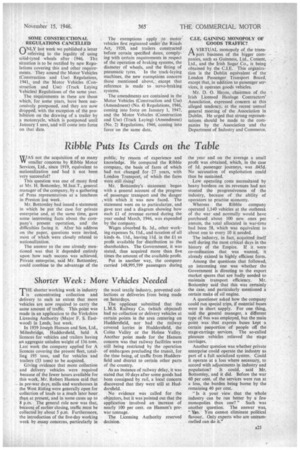Ribble Puts Its Cards on the Table
Page 25

If you've noticed an error in this article please click here to report it so we can fix it.
WAS not the acquisition of so many YY smaller concerns by Ribble Motor Services, Ltd., since 1919, equivalent to nationalization and had it not been very successful?
This question was one of many fired at Mr. H. Bottomley, M.Inst.T., general manager of the company, by a gathering of Press representatives at a luncheon in Preston last week.
Mr. Bottomley had issued a statement in which he put the case for private enterprise and, at the same time, gave some interesting facts about the company's present operation, and the difficulties facing it. After his address on the paper, questions were invited. most of which were closely related to nationalization.
The answer to the one already mentioned was that it depended entirely upon how such success was achieved. Private enterprise, said Mr. Bottomley, could combine to the advantage of the public, by reason of experience and knowledge. He compared the Ribble company, the basis of fares of which had not changed for 27 years, with London Transport, of which the fares were still rising!
Mr. BottOmley's statement began with a general account of the progress of passenger transport and the danger with which it was now faced. The statement went on to particularize, and gave text and a diagram showing how each £1 of revenue earned during the year ended March, 1946, was expended by the company.
Wages absorbed 8s. 3d., other working expenses 5% 11d., and taxation of all kinds 4s. I ld., leaving lid. in the £1 as profit available for distribution to the shareholders. The Government, it was stated, thus acquired more than five times the amount of the available profit.
Put in another way, the company carried 148,995,599 passengers during the year and on the average a small profit was obtained, which, in the case of Id. passenger journeys, was .045d. No accusation of exploitation could thus be sustained.
Low operating costs necessitated by heavy burdens on its revenues had not stunted the progressiveness of the industry, because of the ability of operators to practise economy.
Whereas the Ribble company operated 1,140 vehicles at the outbreak of the war and normally would have purchased about 100 new ones per annum, the total allocated in war-time had been 58, which was equivalent to about one to every 10 it needed.
The industry, in fact, acquitted itself well during the most critical days in the history of the Empire. If it were co-ordination that was wanted, it already existed in highly efficient form.
Among the questions that followed, an interesting one was whether the Government is directing to the export market spares that are badly needed to maintain transport efficiency. Mr. Bottomley said that this was certainly the case, and particularly mentioned a certain make of oil engine.
A questioner asked how the company could run special trips, if essential buses were in short supply. For one thing, said the general manager, a different type of bus was employed, but the main point was that express buses kept a certain psoportion of people off the stage-carriage services. The so-called pleasure vehicles relieved the stage carriages.
Another question was whether private enterprise could operate the industry as part of a full socialized system. Could it operate at a loss where necessary, to accord with adjustments in industry and population? It could, said Mr. Bottomley, and it did. Before the war 60 per cent, of the services were run at a loss, the burden being borne by the remaining 40 per cent.
"Is it your view that the whole industry can be run better by a few monopolies than one?" Such was another question. The answer was, " Yes. You cannot eliminate political flavour. Only experts who are untrammelled can do it."




































































